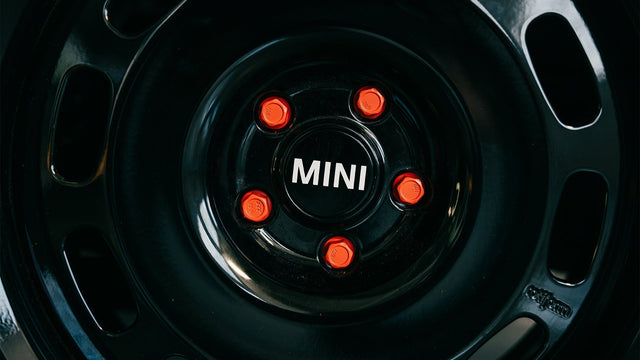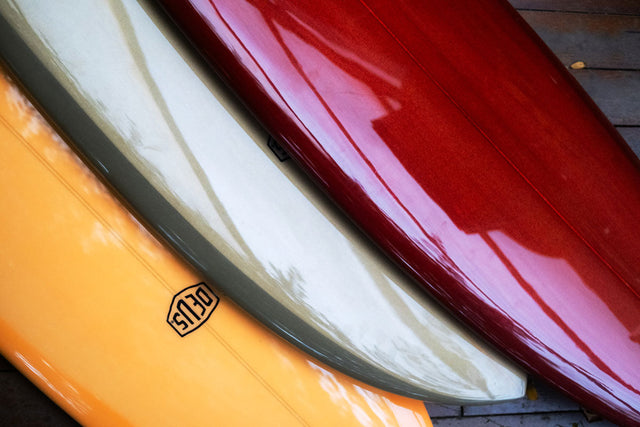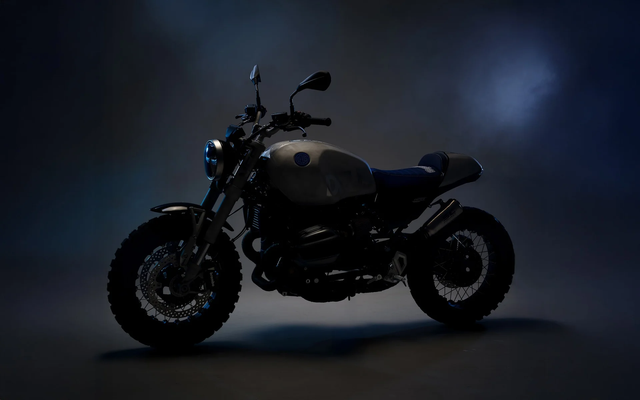


Dare Jennings, founder of Deus ex Machina, at his headquarters in Sydney’s Camperdown.
Photo: Nic Walker BROOK TURNER
Guests at the launch of Deus Ex Machina in Milan. There was no invitation per se. Still they came, various scions of the Zegna, Marzotto and Missoni dynasties in among the hardened hipsters and benzina teste of Europe’s bike and fashion capital, Milan. Their host, company doctor and former Ducati boss, Federico Minoli, had announced his new venture by blog, then got his cousin to set up a Facebook page. Before work had even begun on its new European headquarters, Deus Ex Machina Milano had more than 8000 friends, a thousand of whom turned out to wet the baby’s head at the launch party on the Friday after the Milan bike show in November.
What drew them – without a single PR maven, party planner or A-list – was word of mouth, the jungle drums of one of a truly thriving contemporary tribe, middle-class bikers: the cashed-up lifestyle movement that took up where surfing left off (some say lost its way) decades back.
Those drums were in turn galvanised by the news that two of the tribe’s chiefs were joining forces. The first, Minoli, 63, is the former management consultant who not only saved Ducati from insolvency in 1996 – slashing overheads, quadrupling production and recording annual revenue growth of 20 per cent – but returned it to Grand Prix and World Superbike glory, reasserting its credentials as the world’s coolest two-wheel brand. The second is Mambo founder Dare Jennings, 62, who after selling out of the surfwear label in 2000, launched his second-coming cycles-and-clothes empire Deus Ex Machina five years later in a vast, boy’s-own fun palace in Sydney’s inner west.
Now Minoli was heading a group backing Deus into bike-mad Milan in a million-dollar licensing deal that included a big new store, opening in late January in the city’s hip new Isola district near the Porta Garibaldi station, an emerging cycle, fashion and design hub in a city that is itself a hub. The reaction couldn’t have been more rhapsodic on both sides. “It’s a dream come true,” says Jennings. “The fact that the very highest level of motorcycling is sufficiently interested in what Deus does to want to do it in Italy is incredibly exciting.”
That dream is long-cherished. Jennings always saw Deus – which spans customised motorbikes, bikes, clothing and accessories – as an international proposition. It’s one of the things that originally attracted him to motorcycles as a business model: that they were a lingua franca, a cross-cultural lifestyle platform for everything from clothes to food, surfboards, even art.
In 2009 he took Deus into Bali via a new-build, two-acre complex that towers over the rice paddies of Canggu near Echo beach and includes motorcycle and surfboard work-shops, an artist studio, restaurant and store. Last year he opened in the throbbing heart of another hipster paradise, Venice Beach in Los Angeles. Each move has been duly docu-mented in blogs, print and online magazines around the world.
“We are very visible and we are being embraced,” Jennings says, in the office of his Camperdown headquarters, a Deus hoarding propped against one wall, facing shots of Janis Joplin in the bar of the Festival Express, care of Jennings’ late brother-in-law, Columbia Records’ creative VP Bob Cato. “That’s the biggest difference between Mambo then and Deus now,” Jennings says. “Everything’s online and everyone sees it. If we build a motorbike and photograph it, by the next day someone in Greenland has emailed about it.”
Which is why Minoli never doubted Milan would work. “The motorcycle community is very connected inter-nationally; they already knew Deus from Sydney or Bali or Venice Beach,” he says from his home in Bologna. “I think Deus is very cool and it’s the right thing at the right time. People are tired of performance alone. They’re exasperated by it; they don’t want those monsters in the street. But the coolness of motorcycles remains; we are all passionate about it and we are always talking about what will be the next big thing. Deus is the answer to that because it allows you to be involved personally; you can build your own bike in your own image, and that ties people to act as a group, as a community, a tribe if you like.”
Minoli should know. The Italian’s success at Ducati when it was owned by private equity firm Texas Pacific Group resulted as much from his instinct for the clan and its mores, including his own very successful Ducati blog, as the structural changes he made to the business. “My entire career there was about building the Ducati tribe,” he says. “We had a very good presentation which around the universities called ‘from customer to tribe’. That is what I think Deus is doing, so it was natural for us to say this is a great idea, and of course we loved Dare and his past and what he had done at Mambo.”
With its subtly retro allure, its prelapsarian Peter-Pan appeal, Deus could be a riff on the Minoli play book, celebrating as it does “a custom motorcycle culture that first appeared in Europe and America in the 1940s” as its Facebook page puts it, together with a more recent era of baby-boomer youth “before the various pursuits of fun – motorcycling, surfing, skateboarding, whatever – were divided into fundamentalist factions”. “Bigger than a brand, it’s a culture” reads one Deus slogan. “In Benzin Veritas” another.
The Deus Italian headquarters will be the same but different from its siblings. There will be a café and the store will carry the Australian clothing inventory into a country where workwear – from Blundstone boots to US brand Woolrich – has a luxury caché it doesn’t carry at home (only in Italy could labour be seen as a style affectation). As for the bikes, they will be “part the Australian bikes, but sourced in Italy and assembled by former Ducati mechanics,” says Minoli. And that, says Jennings, is precisely as it should be. “The bikes will be Italian versions of Deus bikes, but it’s not a blueprint we are selling them. Deus has always been an idea. You can take that idea and put it into different situations and it expresses itself differently.”
Federico Minoli, Ducati CEO and Jennings’ business partner. Getty Images
Dare Jennings’ path to Federico Minoli was at once breathtakingly direct and highly circuitous; its convolutions – from Sydney to New York to Italy to Sydney to Italy – illustrative of the tight-but-loose networks that converge where the bike and business worlds meet.
It started with the larger than life Jeremy Ferris, an Australian “millionaire who hasn’t worked in years” according to the blurb for The Ferris Wheel, a late-night, US cable reality show in which Ferris and his model wife Kate (winner of the 2009 Gold Coast’s Sexiest Woman competition) throw “their open marriage” wide for the cameras.
Jennings knew Ferris from their surfing days in Sydney. One day about five years ago Ferris called in to the Camperdown store and asked Jennings what he planned to do with the business. Jennings explained his overseas aspirations. In doing so he was responding to the regular, periodic itch to shake things up that seems to have afflicted him ever since he pocketed $20 million from the sale of Mambo, the surfwear label he had co-founded in 1984 and sold 16 years later to Gazal Corporation.
Initially Jennings, then 50, had kicked back, albeit a little awkwardly (he has been eloquent on the identity crisis that comes with flogging your life’s work). The upshot of that fallow period was Deus, into which he ploughed a not insubstantial portion of his fortune. As he said at the time, growing up in the ’70s, a surfboard and a motorcycle were the essential young male accoutrement. He’d done surf culture. Biking would be his long suit.
But now that Deus was up and running it needed somewhere to go. Throughout his career the US had been “the windmill I was always tilting at”, he says. “I knew it was going to take money and I realised if I was going to raise some, I’d better start talking to people.” Ferris suggested Jennings see a friend of his in New York, David Bonderman, the legendary co-founder of TPG Capital, whose fortune is estimated by Forbes at $2.6 billion.
Bonderman had studied Islamic law in Egypt as a young man in addition to graduating magna cum laude from Harvard Law School. He celebrated his 70th birthday with a Las Vegas bash at which 700 guests were serenaded by the likes of Paul McCartney and John Fogerty. He had always been the maverick of private equity. And he just happened to have a paternal affection for Ferris.
“So Jeremy gave me his cell number, which I rang and said if you’re in New York, I’m going to be there Wednesday,” recalls Jennings. That was 2007. “I went to his office, which was like going to the doctor – you’re ushered into the room, explain your condition. He said: ‘Jeremy says what you’re doing is really interesting,’ listened attentively and at the end you’re issued a script.” In this case the script was more like a referral to a specialist, Federico Minoli, the man Bonderman had sent in to cure Ducati. That had been something of a labour of love for Minoli, who has pointed out that there were much more profitable patients he might have treated.
“David is someone else who falls in love with stuff,” Minoli says of Bonderman. “He saw Deus and fell in love with it. He said it’s a great idea we should do something with it. And when he thinks motorcycles he thinks of me.” The next thing Jennings knew, Minoli, two Ducati engineers and a cousin-in-law who was an IT expert and had run his blog at Ducati arrived in Sydney. “We rode bikes around Sydney together and wined and dined,” Minoli says. “We really felt part of the group, the ambiance there.” But it quickly became clear that Deus was not a TPG-scale prospect. “Finally they realised that this was a start-up and they don’t really invest in start-ups.”
Minoli decided to proceed on his own account, drawing on his broad and impeccable network. He declines to name the backers who are together sinking $US1 million into the Milan deal, but says they are “a group of very close friends rather than a consortium”.
“We decided that Italy wasn’t covered and we thought northern Italy, in particular Milano, because of its combination of coolness and love of anything that runs on two wheels,” he says. “So we got involved, more out of passion than business savvy. Everyone’s working for free, just for the fun of it. Over time we’ll transform it into a business, but for the moment it’s really that we love it.”
No one knows that affection, or its cost, better than Jennings. Deus turns over $10 million a year but he is yet to see a return on his own investment. The apparel lines always make money, he says, but it’s much harder to turn a profit on everything that sells them – what Jennings refers to as “the fun cultural stuff we do fully and with great conviction”.
“As a European friend of mine said to me when I first told him about my idea: ‘Custom motorbikes, mmm, you can make hundreds out of that,’ to which I replied: ‘Yeah, but only if you don’t count the time involved.’ The fact remains, though, that the cultural platform is what the apparel springs from. The authenticity of the activity is what gives it strength.”
Deus, in which graphic artist Carby Tuckwell and motorcycle expert Rod Hunwick also have stakes, went into Bali with American surf and adventure photographer Dustin Humphrey as a partner. But the GFC got in the way of finding a partner in the US. Venice Beach has been entirely at Deus’s expense. Bali is profitable, Jennings says, while Venice “has been well and truly worth it as an investment in getting a foothold in the US. There’s an incredible energy in Venice now, all the Hollywood people are moving there. It’s surprising how the Americans really want you to do well, whereas in Australia, it’s not quite the same”.
Billy Joel, Orlando Bloom and Ryan Reynolds already sit atop customised Deus bikes. A second European Deus is to open later this year on the edge of Amsterdam’s red light district, under licence to Deus’s Benelux clothing distributor Hein Meurer RER. Jennings has also received offers of licensing deals in Rome and Spain. All up, he is satisfied. “There has been a very heavy investment at this point. That investment was needed to take it to the right level, but it took longer than I’d thought for the revenue to reach the overhead. My problem was that having sold Mambo, I was very impatient for this to be of a similar size. There is a syndrome there, where people who have had successful businesses start again but have trouble realising the level they’re operating at. It does take a while for a brand to settle in. Some days I wake up and think I’m a genius, other days I can’t believe I was so stupid as to start another business.”
“But it’s what I wanted to do,” Jennings says. “Deus is all about adventure and this is a grand adventure. If it all falls apart tomorrow I can at least console myself that it was bloody fun. It’s stressful but I seem to like making things up and having a crack at them. I’m part of the ‘it seemed like a good idea at the time’ business school.”






